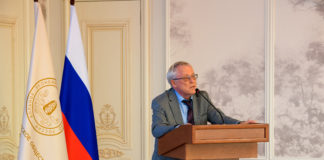This issue’s front man is James Kenneth Galbraith, a prominent American economist, a professor at the University of Texas, the Chairman of Economists for Peace and Security and a member of the International Committee of the Free Economic Society of Russia. James has been following in the footsteps of his father, the great economic visionary John Kenneth Galbraith, who strongly believed the government should play a role in economic planning in the times when such beliefs could get you in trouble just short of being burned at the stake. Now this rule is followed by all the countries that seek to meet the modern development challenges.
Economic Science Week. Вольная экономика (Free Economy Journal) interviewed him at the Saint Petersburg Economic Congress (the interviewer there is Sergey Bodrunov, our editor-in-chief and the president of the Free Economic Society of Russia) devoted to Russia’s industrialization, and at the forum of the International Committee of the
Free Economic Society of Russia in Moscow. We publish both interviews under the Front Man rubric.
March 27. Saint PeteRSburg. Saint Petersburg Economic Congress – SPEC 2017
Prof. Sergey Bodrunov: It’s nice that a professional looking at our economy from the
outside as a specialist sees that it has made some positive steps on the way to returning to an industrial way of development. It’s a very important symbol for all those who are responsible for industrial development. Yet, a lot remains to be done in order for the Russian economy to reach a state in which it can be said to resume a trend of
strong industrial growth. While a new model of economic growth is being developed in Russia which includes the issues related to scientific and technological progress it would be good to see the industrial component playing a major role in this new model. Does Mr. Galbraith share this point of view? Or does he have a different position or opinion on this question?
Prof. James Galbraith: I would not speak of a reversion, certainly not to the industrial model of the Soviet period which was an engineering model on a colossal scale and it suffered from fragility: technologies go out of date and they tend to collapse and the supply chains tend to be too interdependent and fragile, and if they break in any place the system suffers. So the question is really building an industrial model that is suited to an economy that is much more open and less based on scientific and military needs
than the economy of the Soviet Union actually was. And the question is how do you do that. And I think that the functional answer, drawing broadly on the experience of other countries that have experienced and dealt with this including China, including Brazil, but also the advanced countries, Europe, the United States, and drawing on the work of my father, is that one needs to have a number of effective complex organizations that can handle the requirements of a sophisticated and modern industrial sector and whether that’s in the domain of producing transportation products or producing housing or
producing medical care or producing electronic infrastructure or producing energy in the most efficient way. Each of these needs to have a number of sustainable elements including research, including design, including management, including financing, including marketing, and all of those things need to be fostered and sustained. You ask where in the world does this happen? A colleague from Germany came up to me after I
spoke this morning and said, “You know, in Germany we never bought the neo-liberal model.” They chose another way, and I think this is also largely true of the way the Japanese corporations have functioned. So this is a question, the answer to which has to be adapted to the circumstances of any particular not only country but also region within each country, but, broadly speaking, that’s what you need is the ability to handle
complex tasks and you need to have a certain amount of redundancy and competition so that there can be alternative ways forward and the best one can be the one that sets the model for the others.
Prof. Bodrunov: It is probably true that we need to take into consideration the experience of other countries. And of course we need to consider our own Soviet and post-Soviet experience we have accumulated. At the same time, Russia and the rest
of the world have been following essentially the same path which was once traced and described in ample detail by John Kenneth Galbraith, the path of industrial evelopment. True, today we have a different industry, a different quality of industry, but we believe it will still play a major role. How do you see the future of industrial production?
Prof. James Galbraith: Well the future is a question, an issue on which economists do not have a very good record. But let me offer an observation. For the small countries of the world it is very difficult to manage and control their own destiny because they have to compete with the other small countries. For the large countries the possibilities are much larger. And Russia is a large country. China, India, Brazil, these are large countries. So they have capacity. The obstacle to exercising that capacity is, if you like, international private capital. It is the fact that capital can flee or come in, that it can be deployed for very short term, hot money purposes, when what’s needed is long-term and stable development. So this is the policy question that has to be faced. I was an advisor to the government of China in the 1990s and the one steady piece of advice that I actually was able to convey was that it was not a good idea to open the capital market because that would then lead to a great deal of flight from China which would have happened. They are running into some of that problem now. And of course in Russia the situation was very different. It was completely open, and a great deal of
the Russian capital left. This is the question that every country that is large enough has to confront and deal with in order to have a degree of control over the investment decisions that you make at home. Even in the United States. The fact that we did not deal with this in a sensible way is what brought Donald Trump to power, is that precisely certain regions of the country were left without an industrial strategy, and the experience of de-industrialization is hard everywhere and is extremely resisted and objected to by the people who have to live with it. It’s true here and it’s true in
Michigan, Pennsylvania, Ohio, Wisconsin. So the capacity to act is what will govern the country’s ability to determine the future. Establish that capacity and then you have some guidelines which we have been discussing on how you go about acting.
Again to come back to my Chinese experience, if you look at the way the Chinese economy integrated, it had multiple centers of industrial production. The Soviet
Union, in a sense, was one big factory. China had four or five independent regions. They melded them and that gave them competition. And when they needed more competition, airlines for example, they didn’t create a lot of private airlines, they created 10-12 state airlines, province, municipality, and they competed. So you can have competition with still having the capital base controlled within the country. As a friend of mine says, this is like a World Cup in soccer – all the teams are national. Yes, the players can play anywhere privately but when they come to the World Cup they’re
playing for their own country. And that is what makes it possible for a country to have a winning record.
Prof. Bodrunov: You are a prominent specialist in the field of inequality and how inequality as a non-economic factor affects economic growth. Today in our country it is widely believed that economic growth is associated with the excessive inequality problem that Russia is currently facing. The other countries you named, China, India, are facing the same problem. Can you give your assessment of the impact of the existing economic inequality on economic growth?
Prof. James Galbraith: That’s an interesting question. My work on Russia in this era in this field does not include the most recent data so what I can say is about the period that we did study which is up to the early 2000s. What we saw was an enormous increase in inequality in Russia as a result of polarization of regions and polarization of economic sectors. Notoriously, Moscow became relatively rich. Some oil and gas regions of Western Siberia with small population and lots of money, namely Tyumen and
Khanty-Mansi, became very rich. And in the sectors you saw the banking, utilities, energy, and the industrial sector atrophied. That is very clear, and this is the source of rising inequality and it is associated with economic collapse. And my impression is that in the recovery period things got stabilized, that they didn’t continue to rise, at least not so rapidly. So I would conclude that growth in Russia is probably equalizing. Because
what growth means is recovery of an industrial activity which means the creation or recreation of a working population which is the basis of a middleclass existence. It’s not true for all countries. In the United States where growth is so heavily relying on advanced technology and finance when we have growth it tends to be more unequal. But in a country like this one I think that the answer is, growth is good for equality,
and the problem is that you had obviously with the transition created, out of a very egalitarian country, one of the most unequal societies, actually, in the industrial world.
Prof. Bodrunov: Indeed, for the Russian economy to succeed it is very important to address the industrial sector issues, the problem of creating jobs for highly skilled and highly productive workers, and the problem of re-creating a working population, primarily middle-class, and providing opportunities for a broad development of the
industrial sector.
March 29. Moscow. Forum of the International Committee of the Free Economic Society of Russia.
The discussion on the long-term strategy between the followers of the emerging role of the state regulation of economy and the followers of deregulation is coming to an end. In your opinion, which position should be supported by the authorities?
Prof. James Galbraith: There is no hard and fast separation between the state and the economy, because the state is a part of economy itself, and regulation is an essential element of modern economic life. You know, when you are driving a car, you should watch that the engine has enough oil, and the radiator has water, so that the motor won’t burn out. Any system, and the economy is not an exception, demands a balance between the internal forces and the regulatory mechanism, and where this is lacking the system will break down. I wouldn`t like to give specific guidance to Russia. But I can say that right now the government in the USA is attacking the regulation of energy, environmental protection, health care, education, finance, working environment and more. And this is a mistake. It will lead in the end to a collapse of markets and a fall of living standards. Just to take one example, imagine that the air traffic control is privatized. Can a private company provide with air control? Possibly. But I am sure that
with the first accident the public’s confidence would be lost, and then there would be a collapse of air transport, because people would just stop flying. So it is not only effective regulation that is required; it is also necessary that the public have well-justified confidence in the competence and independence of the regulatory authorities.
Prof. Bodrunov: In your opinion, what are the prospects of the economic growth in Russia?
Prof. James Galbraith: It’s obvious, that the Russian economy has strong dependence on world energy prices. It seems to me, that the oil prices do not have promising outlook, not least because of the development of the shale gas production in the USA. In that case, what is left to do for Russia is to rebuild its industry, to invest in infrastructure, putting it otherwise, to conduct the rebalancing of economy to make it less dependent on raw materials. The problem is that the internal financial resources should be found for it; one cannot effectively build an industrial sector if the financial capital in the country is fully free to abandon it. To this I can add that back in the mid-1990s I was an adviser to the State Planning Commission of China, and I urged the government not to embark on immediate liberalization of the capital markets. The Chinese were perhaps surprised at such advice like that coming from an American, except that they understood quite well the economic heritage of this particular American. But then this decision helped them to continue the economic growth, in spite of the Asian economic crisis of 1997.
Prof. Bodrunov: What will be the long-term influence of sanctions on our economy overall and the reduction of the interaction between Russia and the West?
Prof. James Galbraith: It`s hard to say. I’m worried about the direction of the relationships between Russia and the USA. The relationships are currently worse than they used to be in 1970–1980s, at a time when the Soviet Union was described by Americans as the “Evil Empire”. It has influence not much on economy as the ability to listen to each other. The situation has a lot of dangers and increases the risk of direct conflict between our two countries. We could remember that two countries managed to come up with a solution even at the crisis like the Cuban missile crisis in 1962, and at the peak of the Cold War Gorbachev appeared, and despite a strong confrontation they managed to open to dialogue. Currently we are close to the position of Cold War, and for now I don`t see any promising signs, at least from the American side.
Prof. Bodrunov: In Russia the risk of lagging far behind the USA has been recognized. To what extent these concerns are reasonable?
Prof. James Galbraith: Sure enough, each country decides for itself what next step should be the key for its future. For Russia it`s worth comparing with the USA and with Europe in terms of health care and life expectancy – in these spheres there is a space for improvement. You know, the USA exceeds in spending on health care most of the other advanced countries, but nevertheless, but it didn`t become the best in this
sphere. We can say the same about many things. What the USA are really good at are the universities, which became true cultural assets of the country. In one of them I have been working for over 30 years with great pleasure.
Prof. Bodrunov: How the economy of the USA changes in consequence of Donald Trump`s policy? What influence could it have on Russia?
Prof. James Galbraith: This is a question for which I don`t have an answer. Trump appeared with promises of great changes in domestic policy and foreign affairs, but with no specific agenda, and the situation is unique in that respect. So far, not much has happened; the presidency of Trump is possibly the least effective one in all my days, or maybe in the last one hundred years. He has suffered one defeat after another – in the Congress on health care, in the courts on immigration. And among other things Trump`s attempt to improve relations with Russia has faced very strong resistance. This situation could of course change, but the initial indications are not favorable to him.



